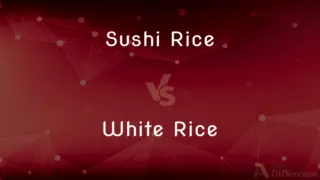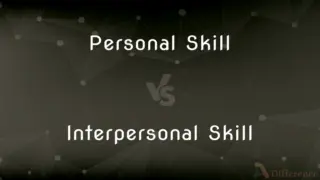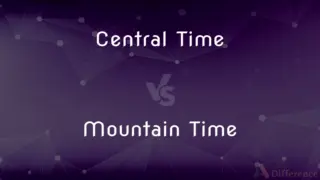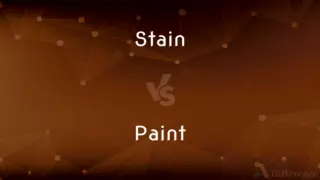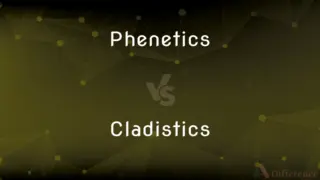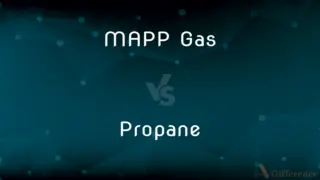Palestinian vs. Philistine — What's the Difference?
By Tayyaba Rehman & Urooj Arif — Updated on March 15, 2024
Palestinian refers to the people or cultural aspects of Palestine, a geographic and political region in the Middle East, whereas Philistine historically refers to an ancient people living in the southern coastal area of Canaan, enemies of the Israelites.

Difference Between Palestinian and Philistine
Table of Contents
ADVERTISEMENT
Key Differences
Palestinians today are recognized as the Arab population residing in Palestine, which includes the West Bank, Gaza Strip, and East Jerusalem. They share a common Arabic language, culture, and history, with their national identity significantly shaped by the geopolitical conflicts in the region. On the other hand, the Philistines were an ancient people, mentioned in biblical texts as having migrated from the Aegean region and settled in the southern Levant, particularly in the Pentapolis cities including Gaza, Ashkelon, Ashdod, Ekron, and Gath, around the 12th century BCE.
The term Palestinian, in modern usage, relates to the contemporary socio-political and cultural identity of people associated with the land of Palestine. This identity is tied to the Arab-Israeli conflict and the pursuit of national self-determination. In contrast, Philistine is a historical term that refers to an Iron Age people known for their conflicts with the Israelites. Their culture, evidenced by archaeological finds, was distinct from that of the Israelites, with whom they had frequent battles as recorded in the Bible.
Palestinians are part of the larger Arab world, with their culture reflecting a blend of various influences, including the Ottoman Empire, British Mandate, and neighboring Arab countries. The Philistines, conversely, are believed to have brought with them Aegean influences, as seen in their pottery and architectural remains, indicating a culture that was both unique to the region and indicative of broader Mediterranean connections.
Palestinians have been at the center of the Arab-Israeli conflict since the mid-20th century, seeking recognition and statehood for Palestine. The Philistines, according to biblical narratives and archaeological evidence, were organized into city-states, each with its own ruler, and were often in conflict with the neighboring Israelite kingdoms, showcasing an early example of the complex interplay of politics, culture, and military rivalry in the region.
The comparison between Palestinians and Philistines illustrates the depth of historical and cultural layers in the Middle East. While Palestinians embody a contemporary struggle for identity and statehood within a centuries-old landscape, the Philistines represent one of the many ancient peoples who have left their mark on the historical and cultural tapestry of the region.
ADVERTISEMENT
Comparison Chart
Definition
People native to or culturally associated with Palestine, today encompassing a national and ethnic identity.
Ancient people from the Aegean region, settled in southern Canaan during the Iron Age.
Time Period
Modern era, 20th century to present.
Historically, around 12th to 7th centuries BCE.
Geographic Region
Palestine (West Bank, Gaza Strip, East Jerusalem)
Southern Levant, particularly the Pentapolis.
Cultural Heritage
Arab culture, language, and history.
Aegean-influenced culture, distinct in the Levant.
Political Context
Central to the Arab-Israeli conflict, with ongoing struggles for statehood and recognition.
Organized in city-states, frequently in conflict with Israelites as per biblical accounts.
Archaeological Finds
Mostly related to Islamic, Byzantine, and Ottoman periods.
Notable for distinct pottery, architecture, and artifacts indicating Aegean influence.
Compare with Definitions
Palestinian
Representative of the Arab community in Palestine.
Palestinian artisans are known for their intricate embroidery.
Philistine
Indicative of the non-Semitic people in the biblical context.
Philistine cities were often at odds with neighboring kingdoms.
Palestinian
Pertaining to the linguistic and historical identity rooted in Palestine.
Palestinian Arabic has distinct dialectical features.
Philistine
An ancient people who settled in the southern coastal area of Canaan.
The Philistines were known for their clashes with the Israelites.
Palestinian
Relating to the modern political and cultural identity tied to Palestine.
Palestinian cuisine is a blend of various regional influences.
Philistine
Associated with the Iron Age city-states in the Levant.
Goliath, a famous figure from the Bible, was a Philistine warrior.
Palestinian
A person belonging to the native Arab population of Palestine.
Palestinians have a rich cultural heritage shaped by centuries of history.
Philistine
Pertaining to archaeological findings in the southern Levant.
Excavations in Ashkelon have uncovered significant Philistine artifacts.
Palestinian
Involved in the struggle for national recognition and statehood.
Palestinian leaders attended peace talks to discuss the future of statehood.
Philistine
Relating to the culture or artifacts of the Philistine civilization.
Philistine pottery shows clear Aegean influences.
Palestinian
Of or pertaining to Palestine.
Philistine
A member of a people, perhaps of Aegean origin, who settled ancient Philistia around the 12th century BC.
Palestinian
A descendant of the Arabs who inhabited Palestine
Philistine
Often philistine A person who is smugly indifferent or hostile to art and culture.
Palestinian
An ethnic group of Arabs formerly living in Palestine
Philistine
Of or relating to ancient Philistia.
Palestinian
Of or relating to the area of Palestine and its inhabitants;
Palestinian guerrillas
Philistine
Often philistine Relating to or having the attitudes of a philistine
"our plastic, violent culture, with its philistine tastes and hunger for novelty" (Lloyd Rose).
Philistine
(derogatory) A person who is ignorant or uneducated; specifically, a person who lacks appreciation of or is antagonistic towards art or culture, and who has pedestrian tastes.
Philistine
(derogatory) Ignorant or uneducated; specifically, lacking appreciation for or antagonistic towards art or culture, and having pedestrian tastes.
Philistine
A native or an inhabitant of ancient Philistia, a coast region of southern Palestine.
Philistine
A bailiff.
Philistine
A person deficient in liberal culture and refinement; one without appreciation of the nobler aspirations and sentiments of humanity; one whose scope is limited to selfish and material interests.
Philistine
Of or pertaining to the Philistines.
Philistine
Uncultured; commonplace.
Philistine
A person who is uninterested in intellectual pursuits
Philistine
A member of an Aegean people who settled ancient philistia around the 12th century BC
Philistine
Of or relatin to ancient Philistia or the the culture of the Philistines
Philistine
Smug and ignorant and indifferent or hostile to artistic and cultural values
Common Curiosities
Who were the Philistines?
The Philistines were an ancient people from the Aegean region, settling in the southern Levant and known for their conflicts with the Israelites.
How are Palestinians involved in political conflicts?
Palestinians are central to the Arab-Israeli conflict, with ongoing struggles for statehood, sovereignty, and recognition in international forums.
What distinguishes Palestinian culture?
Palestinian culture is characterized by its Arab heritage, language, and traditions, influenced by the region's history and geopolitical dynamics.
How is Palestinian identity expressed today?
Palestinian identity is expressed through language, cultural practices, resistance, and the ongoing struggle for national recognition.
How do Palestinians view their historical connection to the land?
Palestinians view their historical connection as deeply rooted, encompassing centuries of habitation, culture, and governance.
Who are the Palestinians?
Palestinians are the Arab population associated with Palestine, involved in the modern socio-political context of the region.
What was unique about Philistine culture?
Philistine culture was marked by Aegean influences, distinct pottery and architecture, and was a significant part of the Iron Age Levant.
Did the Philistines have a written language?
While evidence of a distinct Philistine script is limited, their material culture suggests interactions with neighboring cultures and possibly the adoption of local scripts for administrative purposes.
What is the current status of the Palestinian territories?
The Palestinian territories, including the West Bank and Gaza Strip, are regions of ongoing political dispute and efforts for statehood amidst the Arab-Israeli conflict.
What led to the decline of the Philistine civilization?
The Philistine civilization declined due to factors including military conquests by neighboring peoples and assimilation into larger cultural and political entities in the region.
Where did the Philistines live?
The Philistines settled in the southern Levant, particularly in the Pentapolis region including cities like Gaza and Ashkelon.
Can Palestinians trace their heritage to the Philistines?
While both groups inhabited similar regions, Palestinians and Philistines are distinct, with Palestinians being part of the Arab world and Philistines an ancient people with Aegean roots.
What is the significance of Palestinian and Philistine comparison?
Comparing Palestinians and Philistines highlights the rich tapestry of historical and cultural identities that have shaped the Middle East over millennia.
Are there any archaeological sites related to the Philistines?
Yes, archaeological sites in places like Ashkelon and Ekron have yielded significant findings related to Philistine culture.
What lessons can be learned from the histories of Palestinians and Philistines?
Their histories offer insights into the complexities of cultural identity, conflict, and coexistence in one of the world's most historically rich regions.
Share Your Discovery

Previous Comparison
Elected vs. Selected
Next Comparison
Vitriolic vs. DiatribeAuthor Spotlight
Written by
Tayyaba RehmanTayyaba Rehman is a distinguished writer, currently serving as a primary contributor to askdifference.com. As a researcher in semantics and etymology, Tayyaba's passion for the complexity of languages and their distinctions has found a perfect home on the platform. Tayyaba delves into the intricacies of language, distinguishing between commonly confused words and phrases, thereby providing clarity for readers worldwide.
Co-written by
Urooj ArifUrooj is a skilled content writer at Ask Difference, known for her exceptional ability to simplify complex topics into engaging and informative content. With a passion for research and a flair for clear, concise writing, she consistently delivers articles that resonate with our diverse audience.















